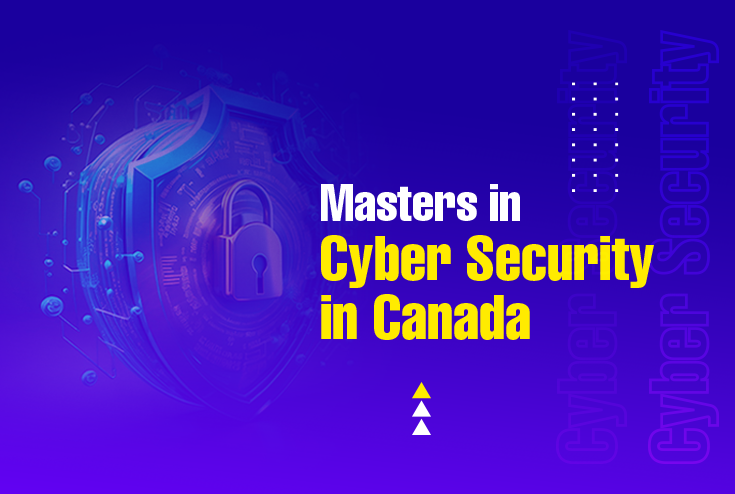
Master’s in Cyber Security in Canada for International Students 2026
Canada has emerged as a leading destination for international students pursuing advanced degrees in cybersecurity. With the digital landscape expanding rapidly and cyber threats becoming increasingly sophisticated, the demand for skilled cybersecurity professionals has reached unprecedented levels. A Master's in Cyber Security in Canada offers international students access to world-class education, cutting-edge research facilities, and substantial career opportunities in one of the world's most technologically advanced nations.
The Canadian cybersecurity sector is experiencing exponential growth, with organizations across industries actively seeking qualified professionals to protect their digital infrastructure. International students choosing to pursue cybersecurity courses in Canada benefit from the country's welcoming immigration policies, multicultural environment, and strong connections between academic institutions and industry leaders. This comprehensive guide explores everything you need to know about pursuing a Master's in Cyber Security in Canada, from program details and university options to costs, scholarships, and career prospects.
Table of Contents
- Master's in Cyber Security in Canada for International Students: Course Overview
- Program Structure and Duration
- Core Curriculum Components
- Entry Requirements
- Program Formats and Flexibility
- Best Universities for a Master's in Cyber Security in Canada
- Total Cost to Study a Master’s in Cyber Security in Canada for International Students
- Tuition Fees
- Other Essential Costs
- Scholarship Opportunities in Canada for International Students
- University-Specific Scholarships
- Government-Funded Scholarships
- Assistantships and Work Opportunities
- Career Opportunities for Cyber Security Graduates in Canada
- Growing Demand for Cyber Security Professionals
- Job Roles and Positions
- Top Employers in Canada
- Post-Graduation Work Permit (PGWP)
- Pathways to Permanent Residence
- Professional Certifications
- Long-Term Career Growth
- Conclusion
- FAQs - Master’s in Cyber Security in Canada for International Students
Master's in Cyber Security in Canada for International Students: Course Overview
Program Structure and Duration
A Master's in Cyber Security in Canada typically spans 1.5 to 2 years of full-time study, depending on the university and program format. Most programs consist of 30 to 45 credit hours, combining coursework, practical labs, and either a thesis or a capstone project. Course-based programs generally take 12-16 months, while research-intensive thesis programs may extend to 24 months.
Core Curriculum Components
The curriculum for a master’s in cyber security covers essential areas, including:
Foundational Courses: Network security, cryptography, ethical hacking, security architecture, risk management, and digital forensics form the backbone of most programs.
Advanced Specializations: Students can explore specialized topics such as cloud security, artificial intelligence in security systems, blockchain security, IoT security, incident response, and security governance.
Practical Components: Hands-on labs, simulation exercises, penetration testing workshops, and real-world case studies ensure students develop practical skills alongside theoretical knowledge.
Research and Capstone Projects: Programs culminate in either a thesis involving original research or a capstone project addressing real-world security challenges in collaboration with industry partners.
Entry Requirements
International students must meet specific admission criteria:
- Bachelor's degree in computer science, information technology, engineering, or related fields with a minimum GPA of 3.0/4.0 or equivalent
- English proficiency: IELTS 6.5-7.0 (no band below 6.0) or TOEFL iBT 86-100
- GRE scores (required by some universities)
- Letters of recommendation (typically 2-3)
- Statement of purpose outlining career goals and research interests
- Relevant work experience in IT or cybersecurity (preferred but not always mandatory)
Program Formats and Flexibility
Canadian universities offer various study formats to accommodate different student needs, including full-time on-campus programs, part-time options for working professionals, and increasingly, hybrid models combining online and in-person instruction.
Best Universities for a Master's in Cyber Security in Canada
Canada is home to numerous world-class institutions offering exceptional cybersecurity programs. Here's a comprehensive overview of the best universities for Nepali students considering cybersecurity studies.
1. University of Toronto
The University of Toronto offers a prestigious Master of Engineering (MEng) in Cyber Security through its Faculty of Applied Science and Engineering. The program emphasizes security systems design, cryptographic protocols, and secure software development.
Program Highlights: Strong industry partnerships, access to advanced research labs, opportunities to work with leading security researchers, and excellent placement rates in top tech companies.
2. University of British Columbia (UBC)
UBC's Master of Data Science with a specialization in Cyber Security combines data analytics with security principles. The program is offered through the Vancouver and Okanagan campuses.
Program Highlights: Interdisciplinary approach, project-based learning, collaboration with government agencies, and strong focus on emerging technologies like AI-driven security solutions.
3. University of Waterloo
Renowned for its co-op program, the University of Waterloo offers a Master of Applied Science (MASc) and Master of Mathematics (MMath) with cyber security focus area.
Program Highlights: Extensive co-op opportunities providing 12-16 months of paid work experience, connections with Canada's technology hub in the Kitchener-Waterloo region, and cutting-edge research facilities.
4. Ryerson University (Toronto Metropolitan University)
Ryerson's Master of Engineering in Computer Networks focuses heavily on network security and cyber defense mechanisms.
Program Highlights: Industry-oriented curriculum, strong emphasis on practical skills, location in Toronto's tech corridor, and partnerships with major financial institutions and tech companies.
5. Concordia University
Concordia offers a Graduate Diploma and Master's programs in Information Systems Security through its Gina Cody School of Engineering and Computer Science.
Program Highlights: Flexible program structure, focus on security management and technical security, research opportunities in the Concordia Institute for Information Systems Engineering (CIISE).
6. University of Calgary
The Master of Science in Information Security at the University of Calgary provides comprehensive training in both technical and management aspects of cybersecurity.
Program Highlights: Strong ties to Calgary's energy sector requiring specialized security expertise, research opportunities in critical infrastructure protection, and practical industry projects.
7. Carleton University
Carleton's Master of Computer Science with a specialization in Network Security is recognized for its research excellence and industry relevance.
Program Highlights: Located in Ottawa, Canada's capital, with numerous government and defense opportunities, access to cutting-edge research centers, and a strong focus on cryptography and secure communications.
8. University of Ottawa
Offering a Master of Computer Science with cybersecurity specialization, the University of Ottawa provides bilingual learning opportunities and strong government connections.
Program Highlights: Proximity to federal government departments, research collaborations with defense agencies, and a unique focus on cyber policy and governance alongside technical training.
Total Cost to Study a Master’s in Cyber Security in Canada for International Students
On average, tuition fees for the cybersecurity program range from CAD 15,000 to CAD 45,000 per year, depending on the university. In addition, international students are required to show evidence of at least CAD 22,895 per year (for a single applicant) to cover living expenses. This makes the total estimated annual cost between CAD 37,895 and CAD 67,895.
1. Tuition Fees
2. Other Essential Costs
- OSHC (Insurance): CAD 600 - 1,000 per year
- Living Cost: CAD 22,895/year (mandatory for visa)
- Visa Application and Biometrics Fee: CAD 235
For a comprehensive breakdown of all the key expenses - from tuition and visa fees to living costs, please refer to this blog:
Cost to Study in Canada from Nepal: 2026 Guide
Scholarship Opportunities in Canada for International Students
Financing your Master's in Cyber Security education in Canada becomes significantly more manageable with the numerous scholarship opportunities available to international students. Canadian universities, government bodies, and international organizations offer various funding options ranging from partial tuition waivers to full-ride scholarships covering both tuition and living expenses. Below are the major scholarship categories and their details.
1. University-Specific Scholarships
Canadian universities recognize academic excellence and diversity by offering merit-based and need-based scholarships specifically designed for international graduate students.
Examples:
- University of Toronto International Awards
- University of British Columbia Scholarships, Awards, & Funding
- University of Waterloo International Student Funding
- Toronto Metropolitan University Graduate Scholarships & Awards
- University of Calgary International Awards
- Carleton University Scholarships
2. Government-Funded Scholarships
Federal and provincial governments in Canada invest substantially in attracting international talent through structured scholarship programs.
Vanier Canada Graduate Scholarships (Vanier CGS)
- Award Amount: CAD 50,000 per year for up to three years.
- Eligibility: Primarily for doctoral students, though some master's students transitioning to PhD programs may qualify. Must demonstrate leadership skills, high academic achievement, and research excellence.
- Application Process: Nomination required from Canadian institution; students cannot apply directly.
- Deadline: Typically November annually.
Ontario Graduate Scholarship (OGS)
- Award Amount: CAD 15,000 per year (two consecutive terms or three consecutive terms totaling 15,000).
- Eligibility: Master's or doctoral students at Ontario universities; some institutions extend eligibility to international students.
- Application Process: Apply through your university's graduate studies office.
- Availability: University of Toronto, the University of Waterloo, Carleton University, Ryerson University, and the University of Ottawa participate.
- Deadline: Varies by institution (typically October-January).
Mitacs Globalink Research Award
- Award Amount: CAD 6,000 for 12-week research projects; CAD 15,000 for master's research internships.
- Eligibility: International students conducting research collaborations with Canadian universities and industry partners.
- Application Process: Apply through the Mitacs portal with supervisor endorsement.
- Focus Areas: STEM fields, including cyber security, computer science, and engineering.
Ontario Trillium Scholarship (OTS)
- Award Amount: CAD 40,000 per year for up to four years.
- Eligibility: International doctoral students at participating Ontario universities.
- Note: While primarily for PhD students, some universities may consider exceptional master's students planning to continue to doctoral studies.
- Application Process: Institutional nomination required.
3. Assistantships and Work Opportunities
Beyond traditional scholarships, Canadian universities offer employment-based funding that provides both financial support and valuable professional experience.
Teaching Assistantships (TA)
- Compensation: CAD 5,000 - CAD 15,000 per year (varies by institution and course load).
- Responsibilities: Assisting with undergraduate courses, grading assignments, conducting tutorials, holding office hours, and supporting professors with course administration.
- Time Commitment: Typically 10-15 hours per week (approximately 130-195 hours per term).
- Eligibility: Graduate students with strong academic records and relevant subject expertise; priority often given to doctoral students, though master's students frequently receive positions.
- Benefits: Teaching experience enhances CV, develops communication skills, and builds academic credentials.
Research Assistantships (RA)
- Compensation: CAD 10,000 - CAD 20,000 per year (some positions offer up to CAD 25,000).
- Responsibilities: Conducting research under faculty supervision, data collection and analysis, literature reviews, preparing research reports, and contributing to publications.
- Time Commitment: 10-20 hours per week; may vary based on project demands.
- Eligibility: Students in research-based programs with skills matching faculty research needs.
- Benefits: Direct research experience, networking with faculty, potential co-authorship on publications, and alignment with thesis work.
On-Campus Work
- Compensation: CAD 15-18 per hour (minimum wage varies by province).
- Work Limit: International students can work up to 20 hours per week during academic sessions and full-time (40 hours) during scheduled breaks.
- Opportunities: Library assistants, IT support, administrative roles, campus services, student services, and departmental support positions.
- Eligibility: Valid study permit; some positions may require work permit authorization.
- Benefits: Canadian work experience, supplementary income, professional skill development, and campus networking.
Co-op Programs
- Compensation: CAD 40,000 - CAD 60,000 annually during work terms (varies by employer and position).
- Structure: Alternating academic and work terms.
- Duration: Typically 4 to 16 months of paid work experience integrated into the degree program.
- Benefits: Substantial income to offset education costs, practical industry experience, professional networking, and often leads to full-time employment post-graduation.
Career Opportunities for Cyber Security Graduates in Canada
Growing Demand for Cyber Security Professionals
Canada's cyber security sector is experiencing significant growth, with organizations across government, finance, healthcare, telecommunications, and technology sectors actively recruiting skilled professionals. According to industry reports, Canada faces a shortage of qualified cybersecurity specialists, creating abundant opportunities for graduates.
Job Roles and Positions
Graduates with a Master's in Cyber Security can pursue diverse career paths:
- Security Analyst: Monitors networks for security breaches, investigates violations, and implements security measures. Average salary: CAD 65,000 - CAD 85,000.
- Penetration Tester (Ethical Hacker): Tests systems for vulnerabilities by simulating cyber attacks. Average salary: CAD 75,000 - CAD 100,000.
- Security Architect: Designs and implements robust security systems for organizations. Average salary: CAD 95,000 - CAD 130,000.
- Incident Response Specialist: Responds to and manages security breaches and cyber incidents. Average salary: CAD 70,000 - CAD 95,000.
- Chief Information Security Officer (CISO): Senior executive role overseeing organizational security strategy. Average salary: CAD 120,000 - CAD 200,000+.
- Cyber Security Consultant: Provides expert advice to organizations on security best practices. Average salary: CAD 80,000 - CAD 120,000.
- Security Software Developer: Creates security tools and applications. Average salary: CAD 75,000 - CAD 110,000.
- Forensic Computer Analyst: Investigates cyber crimes and recovers digital evidence. Average salary: CAD 70,000 - CAD 95,000.
Top Employers in Canada
Major employers hiring cyber security professionals include:
- Technology giants: Microsoft, Google, Amazon, IBM, Cisco
- Financial institutions: Royal Bank of Canada, TD Bank, Scotiabank, BMO
- Telecommunications: Bell Canada, Rogers, Telus
- Government agencies: Canadian Security Intelligence Service (CSIS), Communications Security Establishment (CSE), Royal Canadian Mounted Police (RCMP)
- Consulting firms: Deloitte, PwC, EY, KPMG, Accenture
Post-Graduation Work Permit (PGWP)
International students who complete a Master's in Cyber Security from a designated learning institution are eligible for a Post-Graduation Work Permit valid for up to three years, allowing them to gain valuable Canadian work experience.
Pathways to Permanent Residence
Canada's immigration system offers multiple pathways for cyber security professionals:
- Canadian Experience Class: For individuals with Canadian work experience and language proficiency.
- Provincial Nominee Programs (PNP): Various provinces actively recruit technology professionals through dedicated streams.
- Federal Skilled Worker Program: Points-based system favoring education, work experience, language skills, and age.
- Global Talent Stream: Fast-tracked work permit processing for in-demand occupations, including cyber security roles.
Professional Certifications
To enhance career prospects, graduates can pursue industry-recognized certifications, including CISSP (Certified Information Systems Security Professional), CEH (Certified Ethical Hacker), CISM (Certified Information Security Manager), CompTIA Security+, and GIAC Security Essentials.
Long-Term Career Growth
The cyber security field offers excellent long-term growth potential. As organizations continue to digitize operations and cyber threats evolve, demand for advanced security expertise will only increase. Master's graduates are well-positioned for leadership roles, with many advancing to senior management positions within 5-10 years of graduation.
Conclusion
Pursuing a Master's in Cyber Security in Canada for international students represents a strategic investment in a future-proof career. Canada offers an unparalleled combination of high-quality education, diverse program options at top-ranked universities, reasonable costs compared to other developed nations, generous scholarship opportunities, and clear pathways to employment and immigration.
The best universities for master's in cybersecurity in Canada provide rigorous academic training combined with practical experience, preparing graduates to tackle complex security challenges in today's digital world. While the cybersecurity course in Canada fees require significant financial planning, the availability of master's in cybersecurity in Canada scholarships, assistantships, and part-time work opportunities makes this education accessible to talented international students.
Upon graduation, the robust Canadian job market offers cyber security professionals competitive salaries, diverse career paths, and opportunities for rapid advancement. The Post-Graduation Work Permit program and favorable immigration policies further enhance Canada's appeal as a destination for international students seeking not just education but a launching pad for successful global careers.
Contact Maple International Education, and we will help you to prepare your application materials and explore scholarship opportunities. Your path to becoming a cybersecurity leader begins with this important educational decision, and Canada stands ready to welcome ambitious international students ready to make their mark in this vital field. Start your journey today by researching specific master's in cybersecurity in Canadian universities that align with your interests and connecting with current students and alumni.
FAQs - Master’s in Cyber Security in Canada for International Students
1. How much does it cost to study masters in cyber security in Canada?
The total cost for international students ranges from CAD 60,000 to CAD 140,000 for the entire program. This includes tuition fees of CAD 15,000 to 45,000 per year and living expenses of around CAD 23,000 annually. Additional costs include study permit and biometrics (CAD 235), health insurance (CAD 600-1,000 annually), and settlement expenses.
2. Which university in Canada is best for cybersecurity?
The University of Toronto and the University of Waterloo are considered the top choices for cybersecurity. The University of Toronto offers a prestigious MEng in Cyber Security with strong industry connections and excellent research facilities. University of Waterloo stands out for its renowned co-op program, providing 12-16 months of paid work experience. Other top institutions include the University of British Columbia (interdisciplinary approach with an AI focus), Carleton University (strong research in network security and cryptography), and Ryerson University (industry-oriented curriculum in Toronto's tech hub).
3. Which country is best for masters in cyber security?
Canada ranks among the top destinations globally for cyber security education, alongside the United States, United Kingdom, and Australia. Canada offers distinct advantages including affordable tuition compared to US/UK, a 3-year Post-Graduation Work Permit, clear pathways to permanent residence, a booming tech sector with high demand for security professionals, and a safe, multicultural environment. The combination of quality education, reasonable costs, work opportunities, and immigration-friendly policies makes Canada particularly attractive for international students seeking both education and career establishment.
4. Is cyber security in demand in Canada?
Yes, cyber security is in extremely high demand in Canada. The country faces a significant shortage of qualified cyber security professionals as organizations across all sectors, government, finance, healthcare, telecommunications, and technology actively recruit specialists. The digital transformation and increasing sophistication of cyber threats have made security expertise critical. This demand translates to excellent job prospects for graduates, competitive salaries, rapid career advancement opportunities, and strong government support for the cyber security sector.
5. Can I make $200,000 a year in cyber security?
Yes, but typically with experience and in senior leadership roles. Entry-level positions for recent master's graduates start at CAD 65,000-85,000 annually. Mid-level specialists with 3-5 years of experience earn CAD 85,000-120,000. Senior positions like Chief Information Security Officer (CISO), Security Director, or Principal Security Architect can reach CAD 150,000-250,000+, especially in major cities like Toronto and Vancouver or in high-paying sectors like finance and technology. Achieving $200,000+ typically requires 8-10 years of experience, advanced certifications (CISSP, CISM), demonstrated leadership, and specialized expertise in high-demand areas like cloud security or incident response.
6. What is the salary of cyber security in Canada per month?
Monthly salaries for cyber security professionals in Canada vary by role and experience:
- Security Analyst: CAD 5,400 to 7,100 monthly (CAD 65,000 to 85,000 annually)
- Penetration Tester: CAD 6,250 to 8,300 monthly (CAD 75,000 to 100,000 annually)
- Security Engineer: CAD 6,700 to 9,200 monthly (CAD 80,000 to 110,000 annually)
- Security Architect: CAD 7,900 to 10,800 monthly (CAD 95,000 to 130,000 annually)
- Security Manager: CAD 8,300 to 11,700 monthly (CAD 100,000 to 140,000 annually)
- CISO/Security Director: CAD 10,000 to 20,000+ monthly (CAD 120,000 to 240,000+ annually)
Recent master's graduates typically start around CAD 5,800 to 7,500 per month (CAD 70,000 to 90,000 annually), with salaries increasing significantly with experience, certifications, and specialization.




